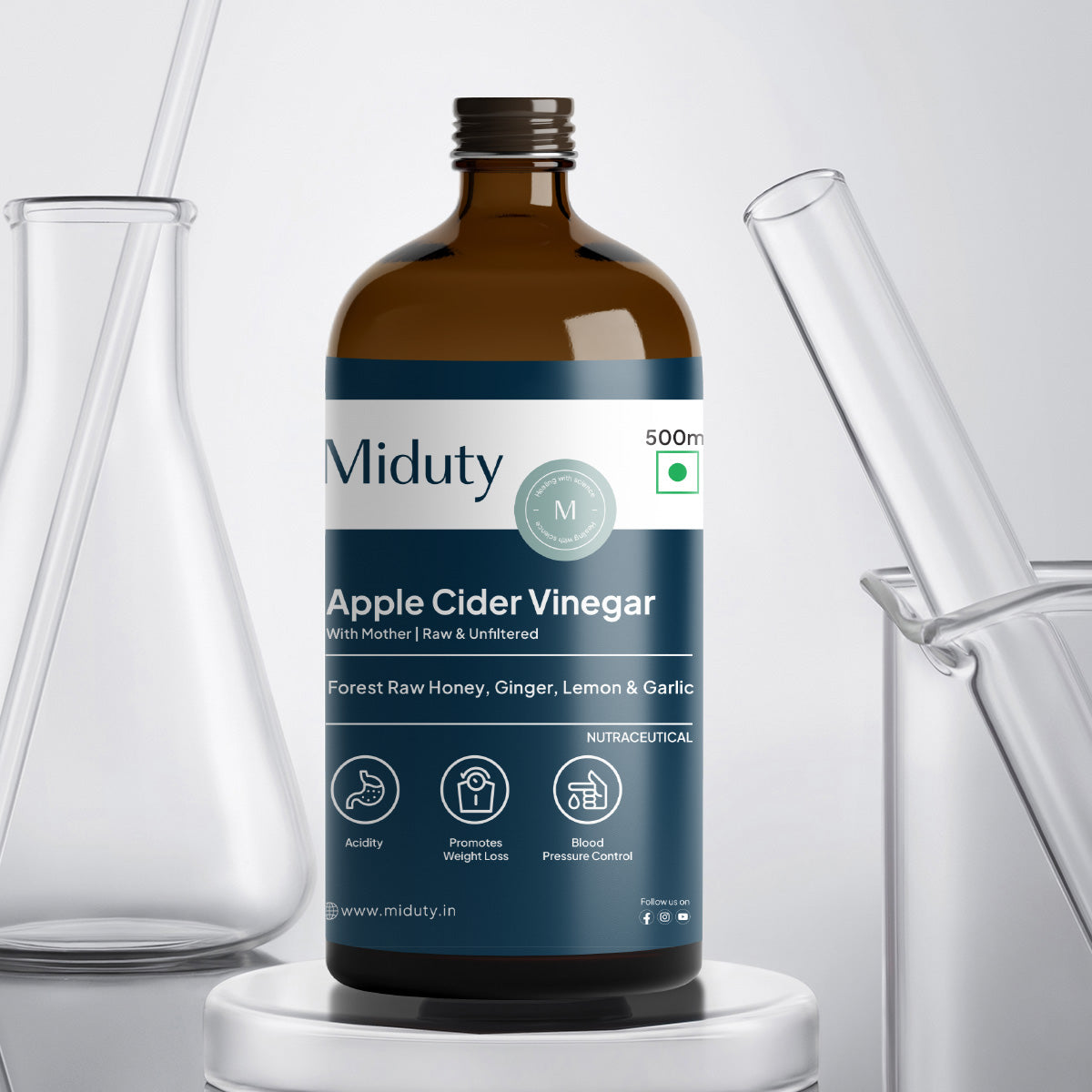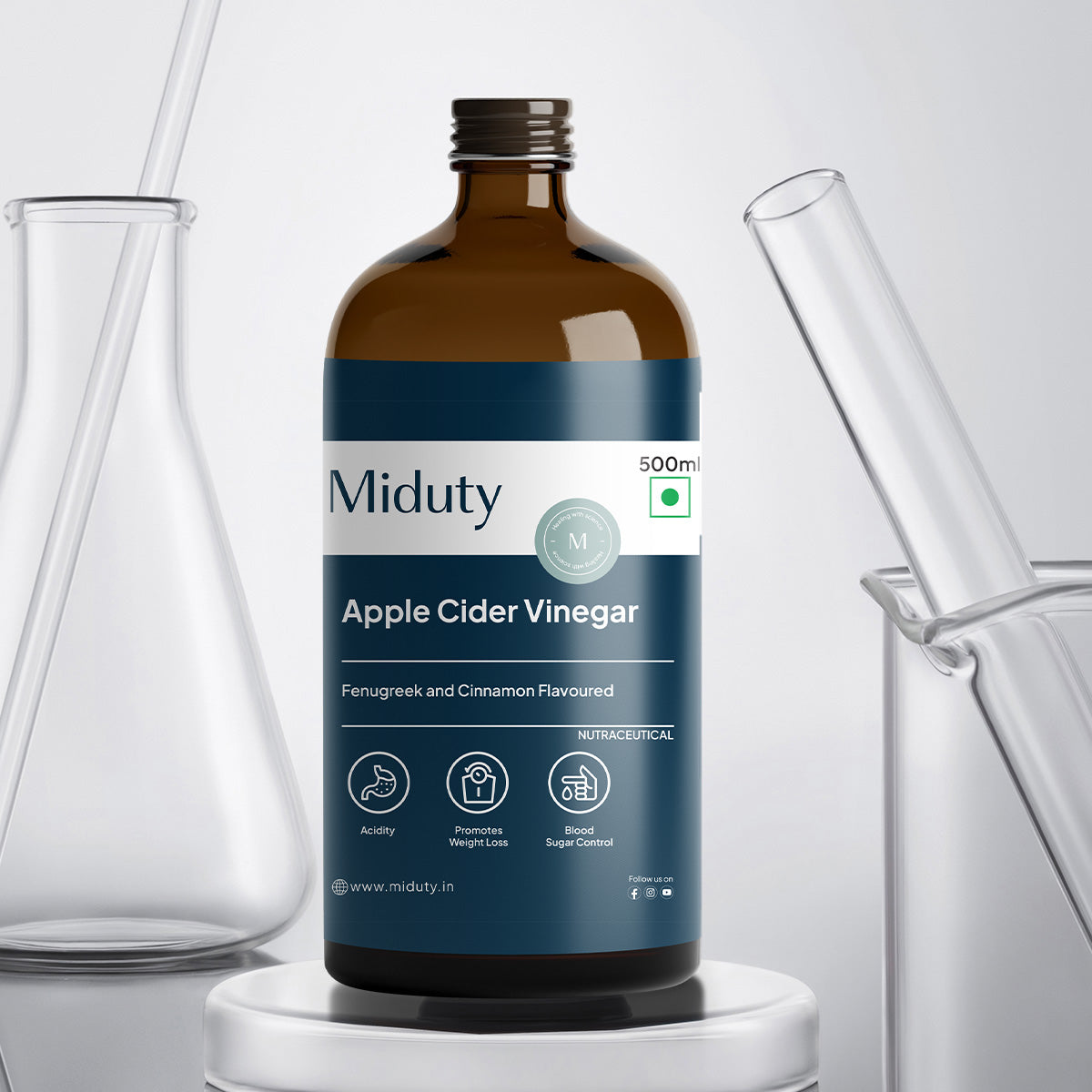
Can You Drink Apple Cider Vinegar On An Empty Stomach?
You may have seen people on social media platforms drinking a glass of water with apple cider vinegar (ACV) first thing in the morning. But does drinking apple cider vinegar on an empty stomach actually benefit your health or is it just another wellness trend gone viral? In this blog, we'll dive into the hard science, the potential benefits, the real risks, and everything in between.
Key Takeaways
1. ACV's Ancient Origins, Modern Craze: Apple cider vinegar (ACV) is a centuries-old remedy making a comeback. From digestive issues to skin health, people have used it for generations, but only recently has science started backing some of its benefits like weight loss and blood sugar control.
2. Scientific Backing for Real Results: Studies show that taking 1–2 tablespoons of ACV daily can lead to modest weight loss and improved insulin sensitivity. When taken before meals, especially on an empty stomach, it may help reduce appetite and stabilize blood sugar spikes.
3. It's Acidic: Drinking ACV without dilution or in excess can damage your tooth enamel, irritate your throat, and trigger acid reflux. If you have digestive sensitivities or are on medications like insulin or diuretics, ACV may not be for you. Always consult your doctor first.
4. Want to Curb Cravings in the Morning: Drinking diluted ACV on an empty stomach 20 minutes before breakfast could help suppress hunger and keep you feeling full longer. It's not a magic bullet for weight loss, but it might give your metabolism a boost especially when paired with a healthy diet.
5. Dilute It Right or Regret It Later: Mix 1 tablespoon of raw, unfiltered ACV with at least 8 ounces of water. Sip it through a straw to protect your teeth, and avoid drinking it just before bed to prevent acid reflux. These small changes make a big difference.
6. Do This Daily for 2 Weeks and Track the Results: Try incorporating ACV into your morning routine for two weeks and observe how you feel; energy, digestion, appetite, and even skin clarity. Pair it with protein-rich breakfasts and see if you notice fewer cravings by mid-morning. The results might surprise you.
Apple cider vinegar isn't exactly new. In fact, it's been around for centuries. Historically used as a natural remedy for various ailments, it's now potentially emerged as a solution for everything from weight loss to clearer skin to gut health. With celebrities and influencers swearing by it, drinking apple cider vinegar on an empty stomach has become the latest morning ritual.
The question is: Is taking apple cider vinegar in an empty stomach actually good for you? Some people claim it boosts digestion and stabilizes blood sugar levels. Others say it helps curb cravings and speeds up weight loss. But there's also a talk about enamel erosion, stomach irritation, and digestive issues.
Let's separate fact from fiction by diving into what apple cider vinegar actually is and what it really does inside your body when consumed first thing in the morning.
What is Apple Cider Vinegar?
Apple cider vinegar is essentially fermented apple juice. It's made through a two-step fermentation process. First, crushed apples are exposed to yeast, which ferments the sugars and turns them into alcohol. Then, bacteria are added to further ferment the alcohol into acetic acid. This is the main active compound in vinegar and what gives ACV its strong smell and taste.
Some types of ACV are unfiltered and contain a substance called "the mother," which is made up of strands of proteins, enzymes, and beneficial bacteria. This is where many of the health benefits are believed to come from.
The Science Behind Drinking Apple Cider Vinegar in Empty Stomach
Acetic acid is the key component that's believed to give ACV its health-boosting powers. Apple Cider Vinegar when consumed on an empty stomach, it:
- Slows gastric emptying, which may help you feel full longer.
- Improves insulin sensitivity, which helps your body use glucose more effectively.
- Reduces the glycemic index of high-carb foods.
- Supports gut health by promoting the growth of beneficial bacteria.
Drinking apple cider vinegar on an empty stomach means acetic acid hits your digestive system first, potentially enhancing its bioavailability. However, it's acidic by nature, so moderation is key to avoid potential side effects like stomach discomfort or acid reflux.
One of the most cited studies on ACV was published in the journal Bioscience, Biotechnology, and Biochemistry. In this 2009 study, 175 overweight individuals consumed either 1 or 2 tablespoons of apple cider vinegar daily for 12 weeks. Those who took 1 tablespoon lost an average of 2.6 pounds, while those who took 2 tablespoons lost about 3.7 pounds without making any other lifestyle changes. [1]
Another study in the European Journal of Clinical Nutrition found that consuming vinegar before a high-carb meal improved insulin sensitivity by 19%–34% and significantly lowered blood glucose and insulin responses. [2]
Health Benefits of Apple Cider Vinegar on Empty Stomach
1. Improved Digestion and Gut Health
Many people take apple cider vinegar in their empty stomach to kickstart their digestion. There's some truth to this. The acidity of ACV can increase stomach acid production, which may help break down food more effectively. This is especially helpful for people with low stomach acid (a condition more common than you might think).
The "mother" in raw ACV also contains probiotics that promote gut flora balance. A healthy gut is linked to improved mood, better immune function, and more efficient digestion.
2. Weight Loss and Appetite Control
ACV's impact on weight loss is often overstated, but it's not entirely false. The same Japanese study mentioned earlier showed modest but measurable fat loss over time. This is likely due to a few key mechanisms:
- Appetite suppression: Drinking it before meals may reduce hunger.
- Blood sugar stabilization: Reduces insulin spikes, which can prevent fat storage.
- Delayed gastric emptying: Helps you feel full longer.
If you're trying to shed a few pounds, adding a diluted tablespoon of apple cider vinegar to your morning routine could give you a slight edge.
3. Blood Sugar Regulation
Perhaps the most well-researched benefit of drinking apple cider vinegar on an empty stomach is its effect on blood glucose levels. A study showed that taking vinegar before a meal improved insulin sensitivity by 34% in those with insulin resistance. For people with type 2 diabetes or those managing pre-diabetes, this could be a good option though it should never replace medication without a doctor's approval.
4. Supports Heart Health by Improving Lipid Profile
Emerging evidence suggests that ACV may aid cardiovascular health by helping regulate cholesterol and triglyceride levels. For example, a meta-analysis of clinical trials found that regular ACV consumption typically around 1–2 tablespoons daily for 8–12 weeks led to significant reductions in fasting blood glucose (FBG), HbA1c, total cholesterol (TC), and triglycerides (TG) among participants, particularly those with diabetes. [3] This suggests that incorporating apple cider vinegar in an empty stomach could indirectly support heart health through metabolic improvements.
Potential Side Effects and Risks
1. Tooth Enamel Erosion and Acid Reflux
As much as we love the idea of a miracle drink, it's important to acknowledge that apple cider vinegar is highly acidic. Drinking apple cider vinegar in an empty stomach without proper dilution can wreak havoc on your dental health. The acetic acid in vinegar has a pH level of around 2.4 similar to battery acid.
Over time, this acidity can erode tooth enamel, making your teeth more sensitive and prone to decay. According to the American Dental Association, repeated exposure to acids can thin the enamel layer, leading to long-term damage. To minimize this risk, always dilute ACV in at least 8 ounces of water, and consider drinking it through a straw to limit contact with your teeth. [4]
As for your stomach, those with a history of acid reflux or ulcers should approach with caution. Some users report increased stomach discomfort, burning sensations, or acid reflux after drinking ACV in the morning. This happens because the acidity may aggravate the stomach lining especially when consumed on an empty stomach.
2. Interaction with Medications
Apple cider vinegar can interact with medications, particularly those for diabetes and heart disease. Since ACV already lowers blood sugar, combining it with insulin or other glucose-lowering drugs could result in dangerously low blood sugar levels (hypoglycemia).
Likewise, those taking diuretics or potassium-lowering drugs should be cautious, as ACV has been shown to reduce potassium levels in some cases. A 2006 case study in the journal Nephron linked excessive vinegar consumption with low potassium and bone loss in a 28-year-old woman. [5] If you're on medication, consult with your doctor before adding daily ACV to your routine.
3. Delayed Stomach Emptying (Gastroparesis)
For some individuals, especially those with type 1 diabetes, ACV can slow down the rate at which food leaves the stomach a condition called gastroparesis. While this may help with appetite control, it can also lead to nausea, bloating, and erratic blood sugar levels. A study in BMC Gastroenterology found that vinegar significantly delayed gastric emptying in people with diabetes.
4. Throat Irritation and Burning
Undiluted apple cider vinegar is very acidic and can cause throat irritation or a burning sensation, especially when taken straight or in excess. Some users report a sore throat or hoarseness after frequent use. According to health experts, the acid may even cause esophageal injury over time if consumed irresponsibly. Always dilute ACV and avoid taking it right before bedtime to reduce this risk.
Who Should Avoid Drinking Apple Cider Vinegar on an Empty Stomach?
While apple cider vinegar on an empty stomach offers potential health benefits, it's certainly not suitable for everyone. In fact, some groups should avoid this practice altogether or at least proceed with extreme caution.
1. People with Gastrointestinal Conditions:
Those suffering from conditions like gastritis, ulcers, or acid reflux may experience worsening symptoms. The acetic acid can irritate the stomach lining and lead to discomfort, bloating, or heartburn. In these cases, ACV can do more harm than good.
2. Individuals with Kidney Disorders:
ACV is high in potassium and acidity, which can pose a risk to people with kidney disease. Damaged kidneys may struggle to process acid or potassium effectively, leading to health complications.
3. Pregnant or Breastfeeding Women:
While there's no concrete evidence that small amounts of ACV are harmful during pregnancy, there's also no solid research confirming its safety. Erring on the side of caution is always best. Consult a healthcare provider before use.
4. Children and Teens:
Due to the risk of enamel erosion and the intensity of the acid, it's not recommended to give apple cider vinegar to kids, especially not on an empty stomach.
5. Allergy and Sensitivity Considerations:
While rare, allergic reactions to apple cider vinegar are possible. Symptoms may include swelling, hives, difficulty breathing, or digestive upset. If you notice any unusual symptoms after ingestion, stop use immediately and consult your doctor.
Conclusion
So, should you be drinking apple cider vinegar on an empty stomach? Yes, if you're healthy, not on certain medications, and curious about its benefits.
Science backs some impressive benefits of ACV, especially for blood sugar regulation, mild weight loss, and digestive support. But it's not without its risks. The acidity can irritate your stomach, harm your teeth, and potentially interact with medications.
The key is moderation, dilution, and consistency. Don't expect overnight miracles but with proper usage, ACV can be a helpful addition to your wellness toolkit. Try it for a few weeks, listen to your body, and consult your doctor if you have any concerns. Wellness isn't about quick fixes, it's about long-term habits that actually make you feel good.
FAQ's on Apple Cider Vinegar on Empty Stomach -
Q1- Is it good to drink apple cider vinegar in an empty stomach?
Drinking apple cider vinegar (ACV) on an empty stomach may offer benefits like supporting weight loss, blood sugar control, and digestion.
Q2 - Does apple cider vinegar clear the stomach?
Although apple cider vinegar (ACV) is often promoted for digestive benefits, there's little scientific evidence to support the idea that it "clears the stomach.
Q3 - When's the best time to drink apple cider vinegar?
The best time to drink apple cider vinegar (ACV) depends on your goal, but it's typically recommended before meals or on an empty stomach for maximum effect.
Q4 - Can we drink apple cider vinegar daily?
Yes, you can drink apple cider vinegar daily in moderation—typically 1–2 tablespoons diluted in water. However, excessive intake may cause side effects like tooth enamel erosion or digestive discomfort.
Q5 - How long after apple cider vinegar can I eat?
You can eat about 15 to 30 minutes after drinking apple cider vinegar. This timing may help with digestion and blood sugar control.
References












